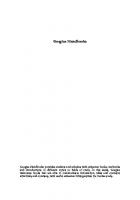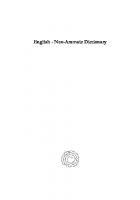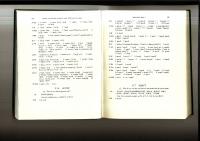English - Neo-Aramaic Dictionary: Dialects of the Jews of Zakho, Nerwa, Amidya and Dehok (North-West Kurdistan) 9781463241452
Based on Sabar's 2002 Jewish Neo-Aramaic dictionary, this dictionary serves a functional purpose for readers and sc
177 97 5MB
English Pages 145 [167] Year 2020
Recommend Papers

- Author / Uploaded
- Yona Sabar
File loading please wait...
Citation preview
English - Neo-Aramaic Dictionary
Gorgias Handbooks
Gorgias Handbooks provides students and scholars with reference books, textbooks and introductions to different topics or fields of study. In this series, Gorgias welcomes books that are able to communicate information, ideas and concepts effectively and concisely, with useful reference bibliographies for further study.
English - Neo-Aramaic Dictionary
Dialects of the Jews of Zakho, Nerwa, Amidya and Dehok (North-West Kurdistan)
Yona Sabar
gp 2020
Gorgias Press LLC, 954 River Road, Piscataway, NJ, 08854, USA www.gorgiaspress.com Copyright © 2020 by Gorgias Press LLC
All rights reserved under International and Pan-American Copyright Conventions. No part of this publication may be reproduced, stored in a retrieval system or transmitted in any form or by any means, electronic, mechanical, photocopying, recording, scanning or otherwise without the prior written permission of Gorgias Press LLC.
ܐ
1
2020
ISBN 978-1-4632-4144-5
ISSN 1935-6838
Library of Congress Cataloging-in-Publication Data A Cataloging-In-Publication Record is available from the Library of Congress. Printed in the United States of America
TABLE OF CONTENTS Table of Contents .............................................................................................. v Foreword ......................................................................................................... vii Some Semantic and Lexical Observations ........................................................ ix List of Abbreviations ...................................................................................... xiii
English—Neo-Aramaic Dictionary .................................................................... 1
v
FOREWORD
This dictionary is based on my Jewish Neo-Aramaic Dictionary (JNAD, 2002),
for readers and scholars who would like to know the Neo-Aramaic words. I, my-
self, use it whenever I want to know a Jewish Neo-Aramaic word that I have
forgotten. It is basically for functional purposes, and, therefore, does not include
grammatical details (m., f., pl.; regular and irregular verbal forms, etc.), and se-
mantic details (cognates or loanwords in original scripts, etc., which the inter-
ested user can easily find in JNAD, but I have included the origin of the words, be it native Old Aramaic (OA), and, in the case of loanwords, the original lend-
ing language, Arabic (Ar), Kurdish (K), Persian (P), Turkish (T), etc. (see below List of Abbreviations). The following short introduction mostly includes some discussion of semantic observations, especially vis-à-vis English, that I have no-
ticed while preparing this volume.
vii
SOME SEMANTIC AND LEXICAL OBSERVATIONS 1. I will not repeat grammatical features that I have extensively described in the
Introduction to my JNAD. Instead, I will record below some semantic and lexical observations that I have noticed while preparing this volume.
1.1 English lexemes may have several Neo-Aramaic translations, usually loan-
words from different languages, or dialects, periods, or with different nuances
useful for the culture, or from different, e.g. “arrange” has: צ-ר- תt-r-ṣ (OA); ); -ר
ג-ד- זr-z-d-g (K), ת-פ/ב- דḏ-b/p-t (Ar ?), ז-ר- כx-r-z (OA), ר-ד- סs-d-r (NT, OA); and some with latent or obvious nuances such as “arrange nicely”: ק-ו- זz-w-q (Ar); ב-ת-ר- תt-r-t-b (Ar). 1.2 “Basket” has nine or ten translations, according to shape, size, material from
which it is made, etc.: זמבילאzambīla wicker basket (Ar/K < OA); טבקṭabaq
shallow basket (Ar); כושאkōša loose dress part that can be used as a basket to carry small things (K “lap”); כראראxarara basket used by porters (Ar ?); מכבה
mıkabbe large and heavy basket made of dry thin tree branches, with a lot of
holes for ventilation, used to cover food on the roof at evening so it will not be
eaten by birds, cats, etc. (Ar); סלשירsallašir deep basket, carried on the back (KAr); עולבכתאʿulblkṯa small (wooden) —, H tevah (( )תבהAr-K < OS); סלכתא/צ
ṣ/sallıkṯa basket, container (K); קופאqūpa small wicker basket (OA< Ak), cog-
nate of H quppah; huge basket קרטאלאqırṭāla (OS/Ar < Gr); cf. OA קרטליתא
qarṭalīṯa small basket.
1.3 Similarly, there are several words for (types of) “gift” (distinction — not al-
ways clear): דיאריdıyyari (K < Ar); הדייהhadīye (Ar); יהותאyhōta (OA);
תישתאנאteštāna (K); כלאתאxleʾta (Ar); generous עטאייתאʿaṭāyıta (Ar); great — פישכשpēškıš (K/P); holiday — אידאנאʾēḏāna (OA); grant a — א-ל- כx-l-ʾ (Ar).
1.4 For types/degrees of “heat”: heat כמאxımma (OA); ( כמימותאwarmth)
xamīmūṯa (OA); כמתאxımta (OA); שכנותšıxnūṯ(a); להווגֹיתאlahwajīṯa (Ar); ix
x
ENGLISH—NEO-ARAMAIC DICTIONARY
טפריתאṭapparīṯa (Ar ?); שלקינאšalaqīna (OA); כלכלתאkalkalta (K); excessive sun
— שרקיתאšarraqīṯa (Ar); of noon — טהראṭahra (OA).
1.5 Complimenting various honest people: honest דורוסתdurust (K); צאדקṣadıq
(Ar); צאלחṣālıḥ (Ar); נקייאnıqya (OA); עאדלʿādıl (Ar); מהימןmhēman (OA);
זאדא- חלאלḥalāl-zāda (Ar-K/P); תרוצאנאtroṣāna (OA); כשרkāšḗr (H); ראסתrāst (K/P); אלחלאל- אבןʾıbn-ilḥalāĺ (Ar) אלחלאל- ולדwıld-ılḥalāl (Ar); צדיקṣaddīq (H); צדאקאṣaddāqa (f.). 1.6 Many names and epithets for God, especially in Rabbinical texts, including
Judaic loanwords from Hebrew and Islamic from Arabic: אילאהאʾilāha (OA);
(live, eternal) קייםqayyām (H); (Name) שםšēm (H); (exalted) תעאלאtaʿāla (Ar);
אלהʾaḷḷah (Ar); (maker of wonders) אואדת עגֹאבהʾawāḏıt ʿajābe (Ar); (merciful) רחיםraḥīm (Ar); (merciful and compassionate) רחום וחנוןrāḥūm we-ḥannūn (H); (creator) כלאקאxalāqa (Ar); (creator of the world) בורא עולםbōrē ʿōlām (H); (Master of the world) אסתאד עולםʾıstāḏ ʿōlām (Ar-H); (God of the universes) אילאהא דעלמיןʾilāha dʿalamīn (OA-Ar); (benefactor) פראאד הווויאתאparāʾıd hawuyāṯa (OA-Ar); (Master of Heavens) רב אל סמאואתrabb ıl-samāwāt (Ar); (master of the world) רבון העולםrıbbōn ha-ʿōlām (H); רב אל עאלמיןrabb ıl-ʿālamīn (Ar); (my God, my Master) רביrabbi (Ar); מולאייmawlāyi (Ar); for God’s sake שם שמיםšēm šāmāyim (H); but מעבודmaʿbud “idol” (Ar); or צנםṣanam; עבודה זרה ʿavōḏa zāṛa (H).
1.7 Types of vessels for preserving liquids, meats: jar כדונאkaddūna (OA); ביקאbīqa (Ar ?); דנתאdanta (OA); כוזאkūza (OA/OS);
לאינאlʾına (OA/OS); סכופאsaxōpa (OA/OS); קוקתאquqta (OS); (large —) קנדלייה qandalīye (K < Ar ?); (large — for carrying water from the river) תלמאtalma (OS); (hole in the ground holding the bottom of jars) דאנכה- כוזיkūzi-dānke (K). 1.8 midwife (old lady) גֹדכהjıddıke (K < Ar); (nanny) דאיינהdāyīne (K); (old mother) דאפירכהdāpīrke (K); (“receiver, welcomer”) מקבלנתאmqablanta (Ar);
קבאלאqabāla (Ar); serve as midwife ל-ב- קq-b-l (Ar).
1.9 Nuances of (“manly”) human beings: אאדמיʾādami (Ar); ענסאן/ אʾı/ʿnsān
(Ar); בן אדםbēn ʾādam (H); (humans) בני בשרbani-bašar (Ar); בריהbırya (OA);
בר נאשהbır nāše (OA); (flesh and blood, weakling) בשר ודםbasar wa-dam (H); נאשאnāša (OA). 1.10 Since many Kurdish Jews worked as loggers, they have different words for different shapes and sizes of wood: ציוהṣīwe (OA); אילאנהʾilāne (OA, Am); many
trees דארה- דארהdāre-dāre (K); forest, thicket דחלהdaḥle (K); poplars, cedars
SOME SEMANTIC AND LEXICAL OBSERVATIONS
xi
ספינדארהspındāre (K); box trees שמשאטהšımšāṭe (P); log רוטאrōṭa (Ar); (short
log) קדאqadda (OA/Ar); (thick and twisted) קורמאquṛma (OS < Gr); (thin and long) ;שקלאšaqla (one half of split tree).
1.11 Some worked as loggers-rafters: טראחהṭarrāḥe (Ar); כלכבאנהkalakvāne (K);
wood-cutters קטאאד ציוהqaṭāʾıd ṣīwe (OA); כלכkalak raft of logs (IrAr/K < OS
< Akk); raft (similar to kalak) כרכאkarxa (OA ?); large barge made of logs tied to inflated ship-skins עבראʿabṛa (Ar ?).
1.12 Others worked as guards: guard (n) נטאראnaṭāra (OA); נאטוראnāṭōra (OA);
market night guard חסאסאḥasāsa (Ar); watchman קלאויזqalawīz (T); road —
ראהיבןrāhivan (K/P); night — נובדרnōbadar (K); police — קואזאqawwāza (Ar); working as — נאטורותאnāṭorūṯa (OA). 1.13 Various ways of eating: — in general ל-כ- אʾ-x-l (OA); — small portions,
have a bite ק-נ-ק- נn-q-n-q III (IrAr); — the entire dish, “clean” the plate ד-י- גg-
y-d (OS/OA); — fruits from the rind or meat off bone ֹג-י- גg̣-ỵ-č̣ III (K ?);— vora-
ciously ג-ה- לl-h-g (IrAr ?); — secretly כ-כ- לl-k-x (OS ?).
1.14 Various head covers for men and women: scarf: head — בוימאbōyama (T?); thin — הברייאhabrīya (IrAr); plain — כפייאkafīya (Ar); silk — כסרווןkasrawan
(P?); modern — for men לפאחאlıffāḥa (Ar ?); — made of white linen for cover-
ing head and face of children and women נגוֹכאnıččōka (K); see also rope-ring;
cover head with linen scarfe כ- ֹג- נn-č-k II (K); woman wrapped in head scarf
חגוֹמהḥıjūme (Ar).
1.15 Several Kurdish words to indicate local landscape valley אאסנאʾāsına (K); נוהאלאnōhāla (K ?); שיוכייאתאšīwıkyāṯa (pl., K); (deep —) כנדאלאkındāla (K); (winding —) גליgali (K).
2. At times, English lexeme has several Neo-Aramaic translations, all or most are
loanwords from one language (Arabic, Kurdish, etc.), perhaps suggesting the importance of that term in the life of that culture, e.g.:
2.1 Honor is very important in Kurdish and Arab societies; the origin of the following synonyms is mostly Arabic : גֹלאלתאjalālıta (Ar); כראמתאkarāmıta (Ar);
חשמהḥašme (Ar); קדראqadra (Ar); עזתאʿızzıta (Ar); שרףšaraf (Ar); usually female’s ערזʿarz (Ar); However, honoring an elder Jew or a Hakham “Rabbi,” a Hebrew word כבודkāvṓḏ (H) is used. 2.3 Religious and legal terms are all loanwords from Arabic or Hebrew: law
שריעתאšarīʿıta (Ar); קאנוןqānun (Ar < Gr); רסוםrısūm (Ar); (religious —) שרע
xii
ENGLISH—NEO-ARAMAIC DICTIONARY
šarʿ (Ar); (Jewish —) הלכהhalāxa (H); (judgment in Jewish —) דיןdīn (H); חוק
ḥōq (H); Even Jewish terms may appear in Arabic : kosher חלאלאḥalāla; unko-
sher חראמאḥarāma; and bow down (in prayer, etc.) ד- ֹג- סs-j-d (Ar), and its variants ֹג-ד- זz-d-j; ֹג-י- זz-y-j. Price (commerce,- usually from Arabic): value פייה fīye (Ar); קימהqīme (Ar); תמןṯaman (Ar); סערsiʿır (Ar); חקאḥaqqa (Ar).
2.4 Musical instruments are usually in Kurdish, especially wind instruments
(used in weddings): flute בלורהbıllūre (K); (shrill —) זרנהzıṛne (K); דודכתא
dūdıkṯa (T/K); תותכאtūtıka (K, originally “small cucumber”). So are some other
popular instruments such as דולאdōla large wedding drum, טמבלכהṭımbılke, tambourine hand drum played while sitting in small parties.
2.5 Variety of flowers are in Kurdish: wild flowers in general ביבונהbēbūne (K);
sprout פשכאpıška (K); rose ורדאwarda (P/Ar); blossom רפכאrappıka (K); spring flower גולבהרgulbahar (K); wild flower גולגֹיגֹכאgulčičaka (K); lily, Susan סיסנה sīsıne (K); all kinds of flowers in a field הלאלת-ו- סוסנsūsın-u-halālat (K). So are
words for “pasture” גֹראčara (K); גֹרואןčerwān (K); כויסתאניkwistāne (K); summer — area זוזןzōzan (K).
2.6 Nuances of “destroy” all in Arabic: כ-ל- הh-l-k (Ar), מ- ֹג- הh-j-m (Ar), ש-ד-נ-פ
f-n-d-š III (Ar ?), מ-ד- עʿ-d-m (Ar), פ-ל- תt-l-f (Ar), י-נ- פf-n-y I (vt), IV (vi) (Ar).
LIST OF ABBREVIATIONS Ak
Akkadian
Am
(dialect of) Amidya
AnAr
Anatolian Arabic
Ar
Arabic (usually literary)
BT
Bible translations
D
dialect of Dihok
En
English
euph.
euphemism
Fr
French
Gr
Greek
H
Hebrew
IrAr
Iraqi Arabic (see Woodhead, D.R. - Beene, W.)
It
Italian
K
Kurdish
NT
Nerwa Texts,
OA/OS
old classical literary (Jewish) Aramaic or (Christian) Syriac
onomat.
(native) onomatopoetic
P
Persian
R
Russian
Rab
Rabbinical texts
T
Turkish (modern and Ottoman)
Z
dialect of Zakho xiii
2
A a; an (indefinite article) כאxa: xa
nāša a person; xa baxta a woman.
(OA).
Aaron (p.n.) הארוןhārun (ArH).
abstinence ( פארזK/P); see also diet. abundance סואאsūʾa (OA); זידהי
zēdahi (ArK); ארזאניʾarzāni (K).
abundant פריהאfrīha; ארזןʾarzan; be
— ה-ר- פp/frh (BT); פ-ח- זzḥf (Ar).
ability כארkār (K); קודרתאqudrıta
abuse; be abused (thing) מ-ד- עʿdm;
able (adj); skillful אוולאʾawla (Ar);
abyss תהוםtíhom (H); עומקהʿumqe
(Ar).
be able י-צ- מmṣy (OA); lamṣın
ʾaxlın I cannot eat; ל-ה- כkhl
(OA) lıbbi lak kāhıl maġvannu I (f) cannot bring myself to talk to them.
abomination מוכרוהותאmukrohūṯa (Ar); פחשfaḥıš (Ar); כרתkırıt
(Ar); כריתותאkıretūṯa (Ar); שקץ
šeqeṣ (H); pl. פשחתיאתאfašḥıtyāṯa
(Ar).
about; approximately ניזיכדnezīkıd (K); אלʾıl (speak) about (prep)
(OA); regarding ענד ;עןʿan; ʿannıd
(Ar).
above (adv) אלאילʾılʾēl. (OA).
Abraham אברהםʾavṛāham; ʾavṛo; ʾaṿṿo (H).
abroad ברת אל/ דיד בלדbarrat ʾıl/did balad. (Ar).
abscess פרצנתאpırṣınta (OS/OA).
absolute(ly not) ( קטעי)יןqaṭʿi(yan). (Ar).
absolve י-ר- שšry (NT; OA). abstain ר-ז- נnzr (BT) (H).
(humans) ל-ז- רṛzl II. (Ar). (Ar)
Abyssinia כושkūš (BT); חבשḥabaš (Ar); Abyssinians חבשאייה ḥabašāye.
acacia שמשטšımšaṭ (P).
accept ל-ב- קqbl; accept as just ק-ד- צṣdq II (ArOA).
acceptable קבילאqbīla (OAAr).
accident; tragic — מקדרmaqaddar (Ar).
accommodation ארכותאʾarxūṯa (OA).
accommodate י-ו- חḥwy (Ar). according to מוגב ֗ mūjıb (Ar). account חסאבḥısab (Ar).
accursed ליטאlīṭa (NT; OA); מלוענא mluʿna (Ar); וזכרוwazıxro (H);
מקוטמנאmquṭmına (OA).
accusation (false) תשקלתאtašqalta (K; IrAr).
accuse מ-ה- תthm (Ar); — (falsely) ל-ק-ש- תtšql III (IrAr).
accuser מקטרגmaqaṭrḗġ (H); false — saxtači (T).
3 accustom ד-ו- עʿwd II (Ar); ז-ר-ש šṛz (K); פ-י- לlyp IV (OA).
advice ר-ו- שšwr II (Ar); ר-ב-ג-ת
tgbr III (Ar).
accustomed ליפאlīpa (OA).
advocate; good speaker אבוקאט
ache (n) מראאmarʾa (OA); מראותא
affair כלמתאxılmıta (K< Ar); קצתא
ache (v) א-ר- מmrʾ (OA). marʾūṯa (OA).
achieve ב-ס- כksb (Ar).
ʾabuqāṭ́ (AnAr < T < It).
qıṣta (K/P < Ar); שולאšūla
(OA/Ar); דעוייהdaʿwiye (Ar).
acne שלוקאšlōqa (OA); one suffering
affection חבהḥıbbe; מוחבהmuḥıbbe
acorn בלוטאbalūṭa (OA).
afflict ב-ר- ֗צẓr-b (Ar); be afflicted
from severe — שלוקאנאšlōqāna.
acquire כ-ל- מmlk (Ar).
acrobat פאלבןp̣āḷavan (K/P). acrobatics פאלבנותאp̣aḷavanūṯa.
action חרכאḥaraka (Ar); mostly in
ḥaraka baraka action is blessing.
additional זודאנאzodāna (Ar).
adherent מלאזםmlāzım (NT; Ar).
adorn פ-ת-פ- תtftf III (H?); ל-ק-ס
sql II (OA/OS); נ-י- זzyn II (NT;
Ar); — a bride ל-מ- כxml II (K).
adornment סוקאליsōqāli (OA/OS).
(Ar).
צ-ק-צ- קqṣqṣ (OA); מ-י- שšym
(OS).
affliction ֗ציקתאẓēqıta (Ar); צודאע ṣudāʿ (Ar); צרותṣārōṯ (H); אדיי ʾaḏīye (Ar); see also harm.
affluence כירxēr (Ar).
afford ד-ע- צṣʿd (‘go up’) with mʾīḏ from hand of (NT; Ar).
after בתרbaṯır; after all הרhar (K/P). aftergrowth כוארסתיxwaristi (K); בכייתאbıxyāṯa (< ?).
adoption כודאניxudāni (K); adopt
aftershave lotion; lavender לאוונטא
adulterer מקחבאנא ;זנאיאzanāya
afterwards בתר האדךbaṯır hādax
adultery זנהzıne (Ar); זנותzınuṯ (H);
again פיבא- ז׳נוžnupēva (K).
ד כודאני-ו-א.
(OA); mqaḥbāna (Ar).
(T < It).
(OA).
קחבותאqaḥbūṯa (H); רשעותא
against מקאבלnıqābıl (Ar).
(OA/H/Ar).
agency וכילותאwakīlūṯa (Ar).
rıšʿūṯa (H); commit — י-נ- זzny
advice תגבירtagbir (K/A);
שירתא
šīrıta (K/Ar); נציחתאnaṣīḥıta (Ar);
משווראmašwara (Ar); כבראxabra
(Ar).
advise ח-צ- נnṣḥ (Ar); give/seek
age עומרʿumır (Ar); חיןḥīn (Ar). agent וכילwakil (Ar).
aggression ג׳ ֗צבġaẓab (Ar); כלויתא
kallawīṯa (< klw ‘behave like a
dog’); סרכיתאsarraxīṯa (OA )?סרח.
4 aggressive סריכאsrīxa; כליואklīwa; תקופהtaqūfa (< H ;)תקףbe — כ-ר- סsrx; ו-ל- כklw.
agile ֗גלנגčalang (K).
agony בזףbızaf (K); awḏ —; ט-פ-ר-פ
prpṭ (OA )? פרפרto agonize; be restless.
agree ק-פ- וwfq II (Ar); ל-ב- קqbl (OA/Ar).
agreeable קבילאqbīla (OA/Ar). agreement (oral) קולqōl (Ar).
(NT).
Alexandria אסכנדרייאʾiskandariya (Ar < Gr)
alien נוכראיאnuxrāya (OA).
alienation נוכריותאnuxrayūṯa (OA). alight (at an inn) י-ר- שšry (OA) alighted שריאšırya (p.p.).
alimony נפקאnafaqa (Ar). alive צאךṣāx (IrAr < T).
all ( כול)וkull(u); ֗גמיעjamīʿ (Ar); (not)
at all קטqaṭ (Ar); יגגאר ֗ yıgjār (K).
agriculture בדאנותאbıḏānūṯa (OA
alley כולאנאkolāna (K); כלייאkalīya
ahead פישייהpēšīye (K); קמאייה
allotment קסטאqısṭa (Ar); אפרזʾıfraz
aid (military) האנאhāna (K); see also
alloy רצץ- גוgu rıṣaṣ (K).
ailment דרדdard (K/P); יסוריןyıssūrīń
Almighty שדיšadday (H).
;)פדנאsee plow. qamāye (OA).
help.
(H; NT).
aim (gun) נ-י- עʿyn (Ar); (intend) ד-צ- קqṣd (Ar).
air פוכאpōxa (OA); הוואhawa (Ar). airhole כאואkāwa (Z; OA); kahwa (OA; NT); pl. כוואוויkawāwe.
airplane ( טייאראAr).
airy פיוכאpayūxa (OA).
alarm; be alarmed ע-ב-ר- בbrbʿ III (Ar ?).
alas תהאtıha; תחאtaḥa’ (K ?). alderman כדכודאkadxuda (K).
alert (adj) פישגאב ֗ peščāv; השיאר hıšyār (K); השרhıššar (Z).
alertness השיארותאhıšyārūṯa (K)
Alexander אלכסנדרוסaleksandros
(Ar ?).
(Ar; NT); תעיןtaʿ(y)īn (Ar; NT).
allusion רמזremez (H; Rab). almond (dry) שאדה- בוbošeʾḏe (OA); (fresh green) שאדה ראדה
šeʾḏereʾḏe; Jordan almonds מלבס
mlabbıs (Ar).
alone btıne (K).
Alphabet אלף ביתʾālef be(th) (H). Alqosh (a Christian village;
traditional site of Prophet Naum)
עלקושʿalquš.
already פישpīš (OA); מדרישmıdreš (OA).
also אפʾap / אופʾup (OA); שיši (usually enclitic) (K); הםham (K/P).
altar מדבחmaḏbaḥ; (pagan) — במה bāma (H; BT).
5 alum שבהšabbe (Ar).
aluminum פאפוןfāfōn (IrAr).
always דאיםdāyım (Ar); הרhar (K).
Amadiya (local town) עמדייאʿamıdya (Ar); עמדנאייאʿamıdnāya.
anemia כימאייkēmāyi (K).
anesthetic פנג ֗ p̣anč (IrAr). angel מלאךmalʾax; (pl.) מלאכינה
malʾaxīne (H); רוחאנייתrūḥāniyat
(pl.; Ar); Angel of death מלכלמות
amazed: be — ב- ֗ג- עʿjb II (Ar);
malkılmot (Ar); מלאך המוותmalʾax
amber (perfume) ענברʿanbar (Ar).
(H; NT); סמאלsammaʾēl (H).
ר-ה-נ- זznhr (Ar/P).
ambush כמיןkamin (Ar)
amen (response in prayer) אמןʾāmēn (H).
amicable כיפכוושkēfxwaš (K).
amity כיפכוושותאkēfxwašūṯa (K). Ammonite ( עמונאיאBT). amnesty עפוʿafu (Ar).
among ביני- מאmabayni (Ar); נאבייאן navian (K); גוgo ( גאודgāwıd) (OA).
amount מוקדרmuqdar (Ar); huge — קנטרqınṭar (Ar).
amputate ֗ג-י- קqyč (< OA )? קצץ. amulet באזבנדאbāzbanda (K/P);
hammáweṯ (H; NT); פלוניpalōni
anger ֗גגראjıgṛa (P); ג׳ ֗צבġaẓab (Ar); ג׳ ֗צבותאġaẓabūṯa; גריתאgırrıta (K);
כורמיסכהkormıske (K); כרבאkarba
(Ar); (excessive) — כרביתא
karrabīṯa (NT); רוגזאrugza (NT).
angrily באבאכיbābāki (K).
angry סימאsīma (Ar); כריבאkrība
(OA); (one prone to get —) כרובא
karōba; כראבאkarāba; be — ב- ֗צ-ג׳ ġẓb (Ar); ר-ג- ֗גjgr (Ar); ב-ר-כ krb; מ-י- סsym (Ar); (become
very —) ר-פ- כkpr (OA); ד-מ-ש
šṃḏ II (H); מ-מ- סsmm II2 (OA).
חורזאḥurza (Ar); טליסםṭıllēsım (Ar
anguish אגרʾagar (K); סכראsakaṛṛa
שדייכאšadday(ika) (H).
animal בהמהbahēma (H); דהבא
< Gr); כתותאkṯūta (OA); ;שדי
analogy ראיהraʾāya (H; Rab).
anchor (wood at river’s bank) י-פ-ק qfy (Ar).
(Ar ?).
dahba (Ar); דואראdawāra (T); חיון
ḥēwan (Ar); house/riding — קניאנאqıınyāna (OA).
ancient קדיםqadīm (Ar); קמאיא
anise (fresh) חליא- ברbırḥalya
and וu; cf. too.
ankle גוזכאgōzaka (K/P).
qamāya (OA); אתיקאatīqa (OA).
anecdote סרהאתיכהsarhātīke (K);
סממנהsammımāne (NT/Rab < H
?); (humorous) — פואהpōʾe (OS).
(Ar/OA?).
anklebone כבאאkabʾa (K< Ar).
anklet חגולכא ֗ ḥıjulka (ArK); כלכאלא xalxāla (K/Ar).
6 annihilate מ-י- תtym (OA).
apprentice שאגרדאšāgırda (T/K








